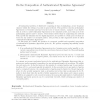Free Online Productivity Tools
i2Speak
i2Symbol
i2OCR
iTex2Img
iWeb2Print
iWeb2Shot
i2Type
iPdf2Split
iPdf2Merge
i2Bopomofo
i2Arabic
i2Style
i2Image
i2PDF
iLatex2Rtf
Sci2ools
116
click to vote
STOC
2002
ACM
2002
ACM
On the composition of authenticated byzantine agreement
A fundamental problem of distributed computing is that of simulating a secure broadcast channel, within the setting of a point-to-point network. This problem is known as Byzantine Agreement (or Generals) and has been the focus of much research. Lamport et al. showed that in order to achieve Byzantine Agreement in the standard model, more than 2/3 of the participating parties must be honest. They further showed that by augmenting the network with a public-key infrastructure for digital signatures, it is possible to obtain protocols that are secure for any number of corrupted parties. The problem in this augmented model is called "authenticated Byzantine Agreement". In this paper we consider the question of concurrent, parallel and sequential composition of authenticated Byzantine Agreement protocols. We present surprising impossibility results showing that:
Algorithms | Authenticated Byzantine Agreement | Byzantine Agreement | Secure Broadcast Channel | STOC 2002 |
Related Content
| Added | 03 Dec 2009 |
| Updated | 03 Dec 2009 |
| Type | Conference |
| Year | 2002 |
| Where | STOC |
| Authors | Yehuda Lindell, Anna Lysyanskaya, Tal Rabin |
Comments (0)

